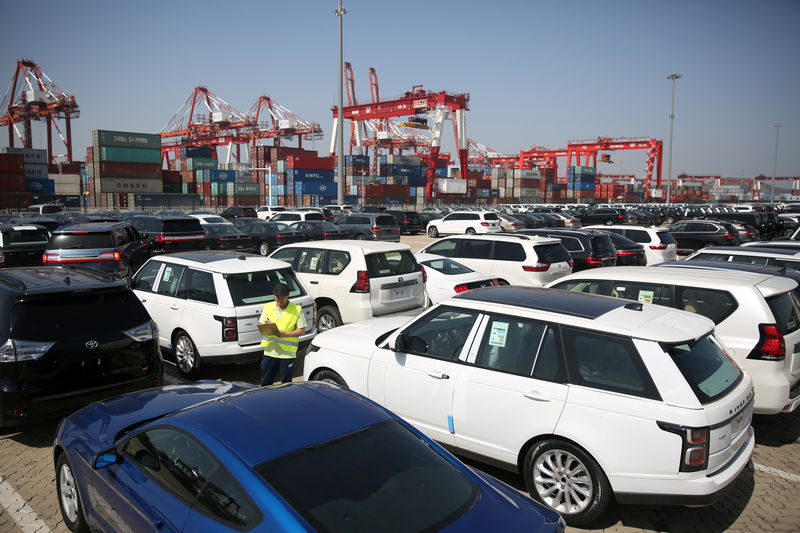BEIJING (Reuters) - China will suspend additional tariffs on U.S.-made vehicles and auto parts for three months starting Jan. 1, 2019, the country's finance ministry said on Friday, following a truce in a trade war between the world's two largest economies.
The Ministry of Finance, in a statement on its website, also said it hopes China and the United States can speed up negotiations to remove all additional tariffs on each other's goods.
"This is a good signal that China and the United States are on track to solve the trade war," said Wang Cun, director of the China Automobile Dealers Association's import committee. "Car makers might be ordering a large number of imported cars now."
Shortly after the Chinese finance ministry's announcement, Tesla Inc (O:TSLA) said it had cut prices on its Model S and Model X vehicles in China.
Joe Hinrichs, president of Ford Motor Co's (N:F) Americas unit, also welcomed China's announcement, noting that the U.S. automaker exported nearly 50,000 U.S.-built vehicles to the country in 2017. "As a leading exporter of vehicles from the U.S., we are very encouraged by China's announcement today," Hinrichs said. "We applaud both governments for working together constructively to reduce trade barriers and open markets."
Auto exports between the two countries are however relatively small. China exported 53,300 vehicles to the U.S. market last year and imported 280,208 U.S. manufactured vehicles, according to data from the China Automotive Technology and Research Center (CATARC), a government-affiliated think-tank.
In contrast, in the first 11 months of this year, China produced 25.3 million cars, down 2.6 percent from the same period last year, industry figures showed.
Wang said car makers in China that imported cars from the United States had seen a 30 percent decline in volume in the first ten months of the 2018, but the tariff cut would bring imports back to previous levels.
German automaker BMW (DE:BMWG) said it welcomes the temporary reduction of tariffs on vehicles imported to China from the United States, adding it is in talks with partners in China how to respond.
The financial impact by fees in China for cars imported from the United States is expected to amount to almost 300 million euros ($338 million) for the BMW Group in 2018, it has said.
The latest announcement on the planned tariff suspension followed China's first major purchase of U.S. soybeans since U.S. President Donald Trump and his Chinese counterpart Xi Jinping's landmark talks on trade in Argentina on Dec. 1.
The tariff suspension and soybean purchase are early signs that the bitter trade war between China and the United States may be starting to thaw.
In Argentina, Trump and Xi agreed to a truce that delayed the planned Jan. 1 U.S. increase of tariffs on $200 billion worth of Chinese goods while they negotiate a trade deal.
A Trump official said on Tuesday that China had agreed to cut tariffs on U.S.-built cars and auto parts to 15 percent from 40 percent.
China's tariff cut was communicated during a phone call between Vice Premier Liu He, U.S. Trade Representative Robert Lighthizer and U.S. Treasury Secretary Steven Mnuchin, the official said.
Earlier this year, China hiked its tariffs on U.S. autos and parts after the United States raised its tariffs on Chinese vehicles and parts to 27.5 percent.

China will now suspend 25 percent tariffs on 144 U.S. vehicle and auto part items and 5 percent tariffs on 67 auto items between Jan. 1 and March 31, the finance ministry said.